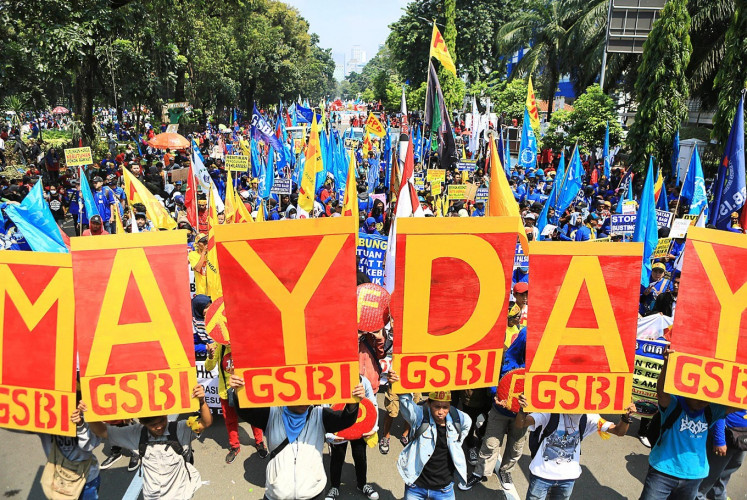Megawati relies on inner circle to remain invincible
Having arrived in Medan, North Sumatra, in mid-June 1996, journalist Joseph Umar Hadi immediately rushed to the Pangkalan Masyhur haj dormitory, where the extraordinary congress of the then-Indonesian Democratic Party (PDI) was taking place
Change text size
Gift Premium Articles
to Anyone

H
aving arrived in Medan, North Sumatra, in mid-June 1996, journalist Joseph Umar Hadi immediately rushed to the Pangkalan Masyhur haj dormitory, where the extraordinary congress of the then-Indonesian Democratic Party (PDI) was taking place.
Joseph, assigned by the Jakarta-based Kompas daily to cover the congress, was denied access to the venue, however, and the authorities refused to provide him with an ID card.
'They [the authorities] identified me as a Megawati [Soekarnoputri, PDI chairwoman] sympathizer. I was then escorted back to the airport and told to immediately leave the city,' Joseph, who covered news relating to the PDI and Megawati in the early 1990s, said in a recent interview with The Jakarta Post.
The 1996 congress, engineered to officiate the removal of Megawati ' whom many considered the strongest contender to succeed president Soeharto in the 1997 presidential election ' from the PDI chairmanship, went ahead just as the government expected.
Elected as the party's leader in 1993 against the will of the authorities, Megawati, the eldest daughter of the country's first post-independence president, Sukarno, was forcefully replaced by senior PDI politician Soerjadi, the person who, ironically, had recruited Megawati and her husband, Taufiq Kiemas, to the party in the late 1980s. Megawati refused to give up, however.
On July 27, 1996, a month after the Medan congress, a clash involving Megawati loyalists and a crowd claiming to be Soerjadi supporters broke out at PDI headquarters in Central Jakarta, killing at least five people and injuring dozens of others.
In 1998, mounting public pressure successfully forced Soeharto to step down after 32 years in power. The following year, the Indonesian Democratic Party of Struggle (PDI-P), the PDI's new name under Megawati's leadership, managed to win the 1999 general election after securing 33.7 percent of the vote.
Megawati was elected vice president in 1999 and finally secured the presidential seat two years later after the People's Consultative Assembly (MPR) unanimously withdrew their mandate for Abdurrahman Wahid, or Gus Dur.
Born in Yogyakarta on Jan. 23, 1947, Dyah Permata Megawati Setyawati Soekarnoputri quickly forged a public image as the defender of wong cilik (the impoverished) after she decided to join the PDI more than two decades ago.
PDI-P lawmaker Budiman Sudjatmiko, who led a small but influential left-wing movement against the Soeharto government in the 1990s, said Megawati's presence in Indonesian politics, which attracted wide international press coverage, significantly changed the country's power landscape.
'Ibu Megawati's success [in securing the PDI chairmanship] in 1993 clearly indicated mounting public disappointment in the performance of Soeharto's New Order. The government, of course, was worried that such a success would soon inspire a much larger opposition movement,' he said.
Named after massive dark clouds that appeared at the moment she was born, Megawati, however, had experienced a series of misfortunes long before her involvement in politics.
In 1967, the young Megawati dropped out of Padjadjaran University in Bandung, West Java, to accompany her father after he had been ousted and sent to live under house arrest.
In January 1970, Megawati's first husband, First Lt. Surindro Supjarso, was killed in an airplane crash in Papua. She was pregnant with her second child at the time of the incident.
Megawati's first son's name is Mohammad Rizki Pratama, or Tatam, and second son's name is Mohammad Prananda, or Nanan.
Surindro's body has never been recovered.
Megawati's mourning continued after her father passed away five months later; his death attributed to a combination of chronic illness and the authorities' reluctance to provide him with appropriate medication.
_____________________
Ibu Mega strictly puts her personal relationships to one side when it comes to making crucial decisions for the interests of the party.
Then in March 1973, Megawati tied the knot with Taufiq, who was a close friend of her elder brother, Guntur Soekarnoputra.
The couple had a daughter, Puan Maharani, who was born a year later.
A long-time admirer of Sukarno and a former student activist, Taufiq became Megawati's most trusted adviser in her later political journey before he passed away last year.
In a recent televised interview, Megawati admitted the vital role her late husband had played in supporting her political career.
'It was like a boxing [match], he was my sparring partner [in politics],' she said.
Despite her motherly charm, Megawati, has been criticized by friends and foes alike for imposing her 'housewife' character on politics, particularly by utilizing her personal feelings in making crucial party decisions.
Megawati, whose relationship with President Susilo Bambang Yudhoyono deteriorated after the latter resigned as one of her ministers ahead of the 2004 presidential election, strongly rejected Taufiq's nomination to become speaker of the MPR in 2009, citing the PDI-P's opposition to Yudhoyono's leadership.
She reportedly agreed to let Taufiq, who earned wide respect from his political peers, run for the post only if the MPR elected him without a vote.
Quoting people in Megawati's inner circle, political communications expert Tjipta Lesmana described Megawati ' the country's fifth president ' in his 2009 book, From Soekarno to SBY, as an introvert who had difficulty articulating her thoughts, making quick decisions and listening to others.
Megawati's reluctance to accommodate dissenting opinions partly contributed, for example, to the dismissal of a dozen key PDI-P figures, including Arifin Panigoro, Roy B. B. Janis and Laksamana Sukardi, who publicly voiced their concerns about Megawati's absolute power in the party, which had officially been granted during the PDI-P's second national congress in 2005.
Another weakness of Megawati's three-year presidency, according to Tjipta, was her failure to maintain a good relationship with the press. As president, Megawati distanced herself from the media following relentless criticism over the relatively poor performance of her government.
During his recent interview with the Post, Tjipta said Megawati has learned a lot from her past experiences.
'In her recent public appearances, Ibu Mega looked much more confident and was more eloquent in expressing her thoughts than she had done a few years ago. Her confidence probably comes from the soaring popularity of her party and Jokowi ahead of the 2014 general and presidential elections,' Tjipta said, referring to PDI-P politician and Jakarta Governor Joko 'Jokowi' Widodo.
With many surveys signaling the PDI-P and Jokowi as the respective likely winners of this year's legislative and presidential elections, it is just a matter of time before Megawati becomes the country's most powerful politician once again.
Taufiq's death had also, to some extent, reinforced Megawati's legitimacy in having the final say on crucial decisions within the party ahead of the elections, including whether she would approve Jokowi's presidential
nomination or run for president herself, Tjipta said.
Budiman admitted Megawati's dominance in the party's decision-making process, but quickly added that she also regularly consulted with senior party figures, like secretary-general Tjahjo Kumolo, party cofounder Sabam Sirait and MPR Speaker Sidarto Danusubroto, before concluding crucial party decisions, including those relating to the presidential nomination.
It is also widely reported that Megawati has frequently sought advice from her confidants from outside the PDI-P, including former industry and trade minister Rini Mariani Soemarno and Yogyakarta-based Gadjah Mada University (UGM) political scientist Cornelis Lay, who has written numerous academic pieces about the party.
Having consistently used Sukarno's creation of Marhaenism ' a socialist ideology that aims to lift up the poorest in society ' as its election campaign theme, there is growing speculation that Megawati has been grooming her children, particularly Puan and Nanan, to lead the party and run as its presidential candidates in the future.
Puan currently chairs the PDI-P faction in the House of Representatives, while media-shy Nanan leads the party's situation room, which provides data and information to the party's central board during deliberations for strategic decisions.
However, PDI-P deputy secretary-general Hasto Kristianto, one of Megawati's confidants in the party's central board, said Megawati never allowed her relationships with her children or any kind of personal closeness interfere with her objectivity when making strategic decisions for the party.
'Ibu Mega strictly puts her personal relationships to one side when it comes to making crucial decisions for the interests of the party. No matter how close a person is to her, she would not let them influence her final say,' he said.
' JP/Hasyim Widhiarto









